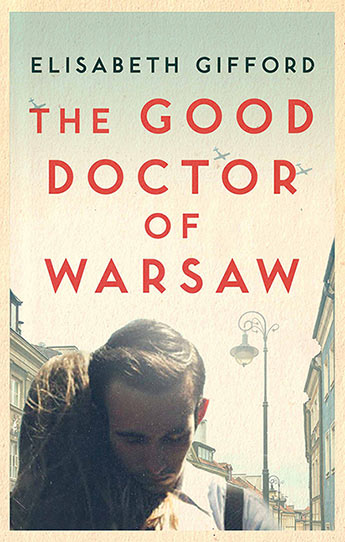 Title: The Good Doctor of Warsaw
Title: The Good Doctor of Warsaw
Author: Elisabeth Gifford
Genre: Historical Fiction
Publisher: Corvus/Allen and Unwin
Published: 21st February 2018
Format: Paperback
Pages: 368
Price: $29.99
Synopsis: Set in the ghettos of wartime Warsaw, this is a sweeping, poignant and heartbreaking tale, based on the true story of one of World War II’s quiet heroes – Dr Janusz Korczak.
‘You do not leave a sick child alone to face the dark and you do not leave a child at a time like this.’
Deeply in love and about to marry, students Misha and Sophia flee a Warsaw under Nazi occupation for a chance at freedom. Forced to return to the Warsaw ghetto, they help Misha’s mentor, Dr Korczak, care for the two hundred children in his orphanage. As Korczak struggles to uphold the rights of even the smallest child in the face of unimaginable conditions, he becomes a beacon of hope for the thousands who live behind the walls.
As the noose tightens around the ghetto Misha and Sophia are torn from one another, forcing them to face their worst fears alone. They can only hope to find each other again one day…
Meanwhile, refusing to leave the children unprotected, Korczak must confront a terrible darkness.
Half a million people lived in the Warsaw ghetto. Less than one percent survived to tell their story. This novel is based on the true accounts of Misha and Sophia, and on the life of one of Poland’s greatest men, Dr Janusz Korczak.
~*~
Based on a true story, and the recollections of Misha and Sophia, the protagonists and what they told their family, The Good Doctor of Warsaw retells the story of the Warsaw ghetto, and the orphanage run by Doctor Janusz Korczak. Told mostly from Misha and Sophia’s point of view as they navigate life within the ghetto with each other the orphans and Doctor Korczak, and each other, it is also the story of courage, and the lengths one man went to so he could protect the children of the ghetto in a time of turbulence in war-torn Europe, and a Warsaw that would soon become unrecognisable. With the ghetto closed off due to claims of disease, starvation begins to set in as the Nazi’s tighten the noose on the ghetto and those within. With meagre supplies being smuggled in from outside the ghetto, Misha and Sophia find themselves separated as they watch everyone they love die, or get marched off to camps in the east, to Treblinka. This is where Doctor Korczak and the children would end up, and where, like many before them, they’d never come home from.
Doctor Korczak’s story is moving and chilling, and his decision to stay with the children, and refusal to abandon his post despite people begging him to save himself is admirable. In a time when he could have taken the easy way out and allowed his Polish and Aryan friends to protect him, he chose to starve and stay with the vulnerable Jewish orphans, and provide a home for them, and a safe place, where they could be loved and listened to.
Elisabeth Gifford’s careful research in Korczak’s life and ideologies on childhood, caring for children, and educating them comes through clearly in the novel, showing the power of love, and respect, where Korczak stood for all children being allowed the same rights and respect, regardless of race, religion, colour, nationality or any other reason someone might use to deny them the rights he believed they deserved. Drawing on Janusz’s journals, and his book, How to Love A Child, and the recollections of Misha and Sophia, Elisabeth Gifford has recreated the hope and horror of the Warsaw Ghetto, and the realisation by many that what was happening was not going to end soon, despite Janusz’s positivity and attempts to keep the children happy and fed, and safe. She has ensured that the gravitas of what happened in the ghetto and during the war is not forgotten, the dangers that Aryan-passing children from the ghetto faced as they found ways to smuggle food from one side to the other, and the hopeless sense of not know if, or when, you or those you cared about might be rounded up and sent off to the camps, a place where you were told you would work. But the fate that awaited them at Treblinka was unforeseen and tragic.
In reading books like this, it reveals the fragility of humanity, and shows what humans are capable of. Janusz sacrificed freedom and life for the children of the orphanage. Elisabeth Gifford has done a fine job recreating this world and story for readers – a story that needs to be told amidst every other fact and report we have from the Holocaust, because it is the human face to these tragedies that should never be forgotten. With novels inspired by true events, the reality of what happened can feel harsher, more eye opening perhaps, but the impact of any accounts and stories will always be significant and thought provoking. The bravery that Doctor Korczak presented, and his care and courage in caring for the children until the end should never be forgotten.
Rooted in one of the darkest moments of human history, it is fascinating, moving, and at times, hard to read and heartbreaking. However, it is also powerful, and a testament to what humans are capable of when they are filled with hatred, but also what they are capable of when they love and accept people as individuals.


Wonderful review Ashleigh. I’m looking forward to reading this novel.
LikeLike
Thank you, I hope you enjoy it!
LikeLiked by 1 person
A story of a true hero and courage in the toughest of circumstances. Nice review.
LikeLike
Thank you.
LikeLike
Excellent review. Sound like a poignant read
LikeLike